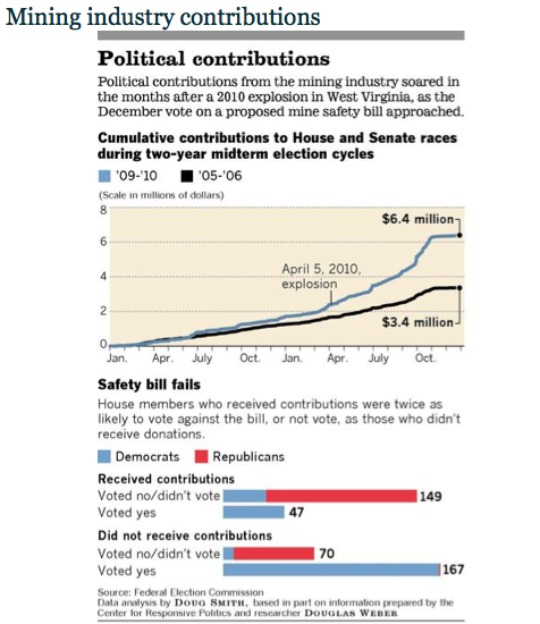A belated laurel to the Los Angeles Times team of Kim Geiger, Tom Hamburger, and Doug Smith, of the paper’s Washington bureau, for their story from last Sunday, “Families of dead miners feel let down by Washington.”
The piece is a follow-up on promises made in the wake of the mining disaster that killed twenty-nine men at Upper Big Ranch coal mine in West Virginia about a year ago. Back then, chances for legislative reforms surrounding the mining industry were looking very good as the nation’s sympathies landed firmly on miners. The incident brought to light one particularly egregious problem that most people agreed needed fixing: a backlog of 16,000 appeals from mining companies cited with safety violations. Until those appeals were dealt with, the cited mines could continue to operate. (We are reminded in the report, “Nearly 300 citations issued at Upper Big Branch between January 2008 and the time of last year’s explosion are still pending review by the appeals board.”)
But in the Times piece this week we learn that, in the year since the Upper Big Ranch disaster, the backlog has climbed to 19,000 appeals.
The report is a walkthrough of how that happened. Here’s how the reporters break down the blocked passage of a bill introduced by Rep. George Miller (D-Martinez) that would have addressed the backlog as well other important issues, like protection for whistle-blowers and increased liability for company men who “knowingly put workers at risk.” Not surprisingly, the reporters only had to follow the money.
…the bill was defeated in the House last year as an anti-government mood swept the country and an industry lobbying campaign targeted swing-district members. Campaign contributions from the industry spiked shortly after the explosion and rose steadily through the rest of the year.
Here are the specifics:
Industry lobbying against the bill was intense. The National Mining Assn. alone reported spending $3.2 million on lobbying last year, a portion of it to oppose Miller’s bill. That effort was joined by hundreds of other companies and trade associations including the U.S. Chamber of Commerce. Overall, the mining industry made $6.4 million in political donations in the 2010 cycle, according to data provided by the nonpartisan Center for Responsive Politics, which developed a detailed history of mining industry lobbying and campaign expenditures in collaboration with The Los Angeles Times.
The industry coalition targeted vulnerable moderate Democrats in swing districts, warning them that the legislation could cost jobs.
Concerned about the fraying prospects, Miller removed sections of his bill governing construction workers and sand and gravel mines. But he insisted on including underground gold, copper and other hard-rock mineral mines after two workers died in an accident at a Nevada gold mine last August.
There’s a handy graphic attached to the report to show just how much donations jumped in the year after the West Virginia explosion.

Also worth noting: “Just before the House voted last December, the Chamber of Commerce designated the bill as a “key vote,” a signal that it could be used to help determine which candidates to support or oppose in upcoming elections.”
The reporters home in on two Democratic representatives—Shelly Berkley and Dina Titus, both of Nevada—to show how money may have played a part in representatives’ decisions on the bill (the evidence is suggestive rather than case-closed.) When Miller made his changes to the bill, the two reps who had initially supported his effort had a change of heart.
Titus said in a recent interview that the legislation should have focused only on coal mining.
“If the bill was not as far-reaching, it would have had a better chance,” she said.
Berkley did not respond to requests for comment.
Titus received $21,000 in campaign contributions from mining interests during the 2010 cycle, and Berkeley received $22,000.
The piece, which includes a number of comments from disheartened family members of those killed in the mines, is a great no-holds-barred bit of follow-up that targets not only donors and receivers but also President Obama. The reporters lead with the speech he gave following the Upper Big Ranch explosion, and its promises that something has to change, before itemizing the ways and reasons that nothing has. This kind of sharp, critical, well-researched revisiting is something we don’t see enough of in the quick-churn news cycle. And three cheers to the Times’s Washington bureau for seizing on this issue when it is somehow both timely and seemingly forgotten.
Also worth checking out: the report is accompanied by a revealing, and downloadable, database showing how representatives voted on the bill and how much money they received from the mining industry in 2009-2010.
Joel Meares is a former CJR assistant editor.
